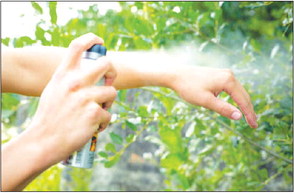Mosquitoes test positive for WNV in Seal Beach


OC VECTOR CONTROL
The Orange County Mosquito and Vector Control District (OCMVCD/ District) has confirmed that mosquito samples in Orange County cities, including Seal Beach, have tested positive for West Nile virus (WNV).
These are the first samples to test positive this year.
Positive mosquitoes were found in surveillance traps set in the area of the Seal Beach Naval Weapons Station. Inspectors will be in the area to check known sources of mosquito breeding and try to identify any unknown sources.
WNV advisory posters have been placed in the affected areas and if OCMVCD has ongoing positive mosquito samples, adult mosquito control may be conducted in the future. All residents should take precautions and wear mosquito repellent when mosquitoes are most active (dawn or dusk). Residents should also check for standing water.
Other positive mosquitoes were collected on July 7 in Cypress at Cerritos Avenue and Lexington Drive, in Anaheim at E. Sycamore and East streets, and in Garden Grove at Garden Grove Boulevard and Stafford Street.
The District has also confirmed that one dead bird with WNV was collected in Irvine.
“West Nile virus positive mosquito samples indicates that the virus is active in Orange County and there is an increased risk for residents to become infected with WNV through a mosquito bite.” Said Robert Cummings, Director of Scientific Services.
West Nile virus is most commonly spread to people by the bite of an infected mosquito. Mosquitoes become infected when they feed on infected birds. There are no confirmed cases of human infections currently in Orange County.
The Orange County Mosquito and Vector Control District staff will continue to conduct surveillance, inspections and control measures for mosquitoes in the areas to prevent additional mosquito breeding.
OCMVCD inspectors are routinely in Leisure World to treat and test Leisure World’s flood channel for mosquito larvae.
Mosquitoes are largely aquatic with most of their development occurring in stagnant water.
WNV is the leading cause of mosquito-borne disease in the continental United States, according to the Centers for Disease Control.
Cases of WNV occur during mosquito season, which starts in the summer and continues through fall. There are no vaccines to prevent, or medications to treat, WNV.
Fortunately, most people infected with WNV do not feel sick. About 1 in 5 people who are infected develop a fever and other symptoms. About 1 out of 150 infected people develop a serious, sometimes fatal, illness. You can reduce your risk of WNV by using insect repellent and wearing long-sleeved shirts and long pants to prevent mosquito bites.
To learn more about West Nile virus, visit www.ocvector.org/ west-nile-virus.



